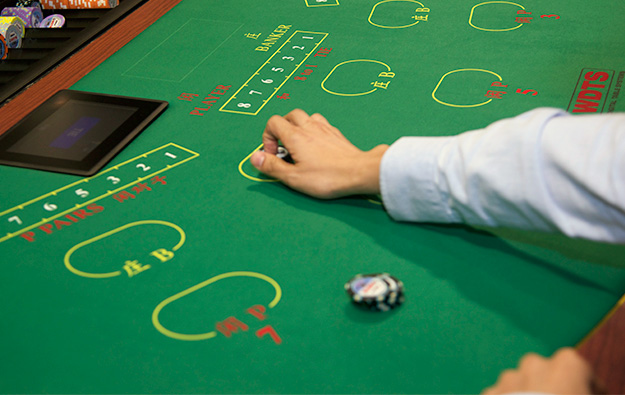Casinos risk losing consumer trust over data: UNLV paper
Jul 03, 2019 Newsdesk Latest News, Macau, Top of the deck, Trends & Tech, World

The casino industry could risk losing consumer trust unless it handled carefully the issues of how it gathers player information and then uses it.
That is the conclusion of an article in the latest edition of the University of Nevada, Las Vegas (UNLV) Gaming Law Journal.
The article author Stacy Norris stated: “The casino industry is based on customer loyalty and winning consumers’ trust and money through service; one wrong step in the collection of personal information could destroy that trust forever.”
Last week Macau’s casino regulator – the Gaming Inspection and Coordination Bureau – confirmed in a statement emailed to GGRAsia that “some” of the city’s casino concessionaires were using facial recognition technology inside their gaming venues.
The regulator added that such testing “needs to follow related privacy protection laws strictly, and can only be used for the protection and safety of persons and property”.
A Bloomberg article published days earlier had claimed digital technology was being used in some Macau casinos to track the players most drawn to risk when gambling.
The article in the UNLV Gaming Law Journal made reference to the technology that was or might be available in Las Vegas and other United States gaming markets, and to what degree use of such know-how might be compatible with citizen rights set out in the U.S. Constitution.
“How far is too far for a company to track its customers and guests without disclosure, and how much of this tracking is within the scope of the United States Constitution?” asked the author.
“For the facial recognition and biometric technology that casinos are entertaining for player tracking, security, and enhancement of customer experience, the comfort level of technology among existing consumers would seem to suggest an easy transition,” notwithstanding civil rights issues, stated the writer.
The Bloomberg article on use of digital technology in Macau had raised the question of where collected data might be kept, and whether protocols might be in breach of Macau’s data protection law.
The UNLV article pointed to the idea that governments and casino regulators faced playing a perpetual game of catch-up when trying to adjust to technological developments from the wider world being applied to the gaming industry. That was especially the case when such innovations often had great appeal to gaming operators and their customers.
The author suggested: “In truth, there is not much one can do in the way of recommending that casinos should or should not incorporate this new technology, as it is inevitable that the benefits to casinos of enhanced player tracking and the collection of biometric data to create a personalised experience will outweigh the concern that some will feel invaded.”
The writer added, referring latterly to the U.S. markets: “The patents have been filed for years, and the technology is waiting to be implemented. Some may already be in place without the author’s knowledge, as casinos’ security outfits keep a tight lid on their operations.”
The article noted however that legislation in the U.S. state of Illinois – the Biometric Information Privacy Act – was a “great example of legislation that allows for the use of biometric technology,” provided that consumers were “given notice that their information is being collected, notice of what that information will be used for and how long, and the ability to consent or refuse consent to the collection and use of their data”.
Related articles
-
 No gaming licensing system gold...
No gaming licensing system gold...Jun 02, 2023
-
 IGSA tech summit to focus on sports...
IGSA tech summit to focus on sports...Jan 11, 2023
More news
-
 Donaco EBITDA up y-o-y to above US$4mln...
Donaco EBITDA up y-o-y to above US$4mln...Jul 26, 2024
-
 HK listed Palasino upgrades Czech...
HK listed Palasino upgrades Czech...Jul 26, 2024
Latest News
Jul 26, 2024
Border-casino operator Donaco International Ltd has achieved a 164.17-percent year-on-year increase in its latest quarterly group earnings before interest, taxation, depreciation and amortisation...Sign up to our FREE Newsletter
 (Click here for more)
(Click here for more)
Pick of the Day
”We’ve got more traction outside of Macau at the moment. But Macau’s going be a bigger focus for us”
David Punter
Regional representative at Konami Australia
Most Popular
 Sheraton brand to exit Londoner Macao, to be Londoner Grand July 25, 2024
Sheraton brand to exit Londoner Macao, to be Londoner Grand July 25, 2024  Macau regulator probes unlicensed gaming agents July 24, 2024
Macau regulator probes unlicensed gaming agents July 24, 2024  Philippines gives 20k aliens in POGOs 60 days to leave July 25, 2024
Philippines gives 20k aliens in POGOs 60 days to leave July 25, 2024  Philippines-listed DigiPlus says not affected by POGO ban July 24, 2024
Philippines-listed DigiPlus says not affected by POGO ban July 24, 2024  Sands China 2Q EBITDA down q-o-q amid low hold, renovation July 25, 2024
Sands China 2Q EBITDA down q-o-q amid low hold, renovation July 25, 2024






